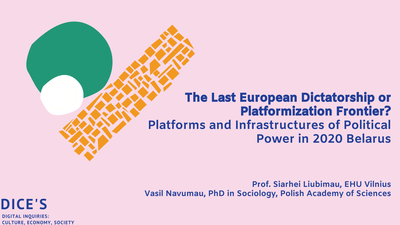Znajdujesz się w: Strona główna > Wydarzenia > Seminarium na temat protestów na Białorusi

Just before the beginning of the 2020 presidential elections campaign in Belarus, the observers could not anticipate the massive mobilization against the long-lasting authoritarian ruler. It was thought that Lukashenko will duly win yet another campaign under the usual slogans of stability and order. However, the president’s poor treatment of COVID-19 pandemic and his misjudgment of other candidates backfired tremendously: frustrated with the rigged statistics of infected with COVID-19 and outraged with the dirtiest presidential campaign, the Belarusians swarmed the squares, despite the threats of the authorities. More Belarusians poured out into the streets after the news about the tortures and brutal beatings in the prisons emerged. The violence, that has been documented by passers-by and activists over August, 9-12, has become the topic on everyone‘s lips and led to the political awakening of those Belarusians, who have always been apathetic towards the events. As a result, in summer and autumn 2020 we witnessed the most massive protest action in the history of Belarus, with hundreds of thousands people demanding the resignation of Lukashenko and investigation of brutal beatings. This set of events has already triggered the fundamental shift in economic, social, and political spheres in the country itself, as well as in foreign relations.
This presentation searches for the concepts and empirical registers to explain this spectacular political change. It does so by exploiting the opposition between the logics of infrastructures on one hand and of digital platforms on the other hand (Plantin et al 2018), the way this opposition develops and stands out in post-Soviet authoritarianism. It documents the modes of mobilization of civil society in 2020 Belarus, assesses the role of digital platforms in this mode, identifies instruments used by the state to destroy this mobilization, and proposes interpretations of the modes of political power thus emerging.
Siarhei Liubimau is a co-founder of the Laboratory of Critical Urbanism (2007) and Associate Professor at the Department of Social Sciences at the European Humanities University in Vilnius (2014). For his doctoral research, he worked with the issue of trans-border urbanism and studied changes of EU internal and external border regimes as urban scale specific processes. Empirically, he worked on towns on the German-Polish and Polish-Belarusian borders (Institute of Philosophy and Sociology, Polish Academy of Science, 2005-2010), as well as with the borders of Luxembourg (Bauhaus-Dessau Kolleg 'EU Urbanism', 2006-2007). Starting from 2015, he has been engaged in the Laboratory of Critical Urbanism in various research, educational and soft planning projects in the former 'nuclear' town of Visaginas in Eastern Lithuania. Together with Felix Ackermann and Benjamin Cope, he has edited a book 'Mapping Visaginas: Sources of Urbanity In A Former Mono-Functional Town', documenting LCU work in the town up to spring 2016. He has been a fellow at the Central European University (Budapest), the Institute for Human Sciences (Vienna) and the Helsinki Collegium for Advanced Studies. He is a member of CityIndustries network (https://cityindustries.org). In fall 2020 he is visiting lecturer at the Institute for Social Anthropology at the Martin Luther University Halle-Wittenberg.
Vasil Navumau (PhD in Sociology, Polish Academy of Sciences), specializes in comparative analysis of contemporary protest trends in the Eastern European countries, under the influence of globalization and ICTs. He implemented research projects in Uppsala University (IRES) in Sweden, Bremen University (FSO) in Germany, Warsaw University ("Artes Liberales" Faculty) in Poland, and Tartu University (Johan Skytte Institute of Political Studies) in Estonia, focusing on the transformation of activism in Belarus, Russia, and Ukraine with the advent of the Internet. Building upon the findings of the dissertation "Social Activism in Contemporary Belarus. New Social Movement Approach to the Tent Camp Protest Action in Minsk, 2006", he published the book "Belarusian Maidan" (Navumau, 2016).